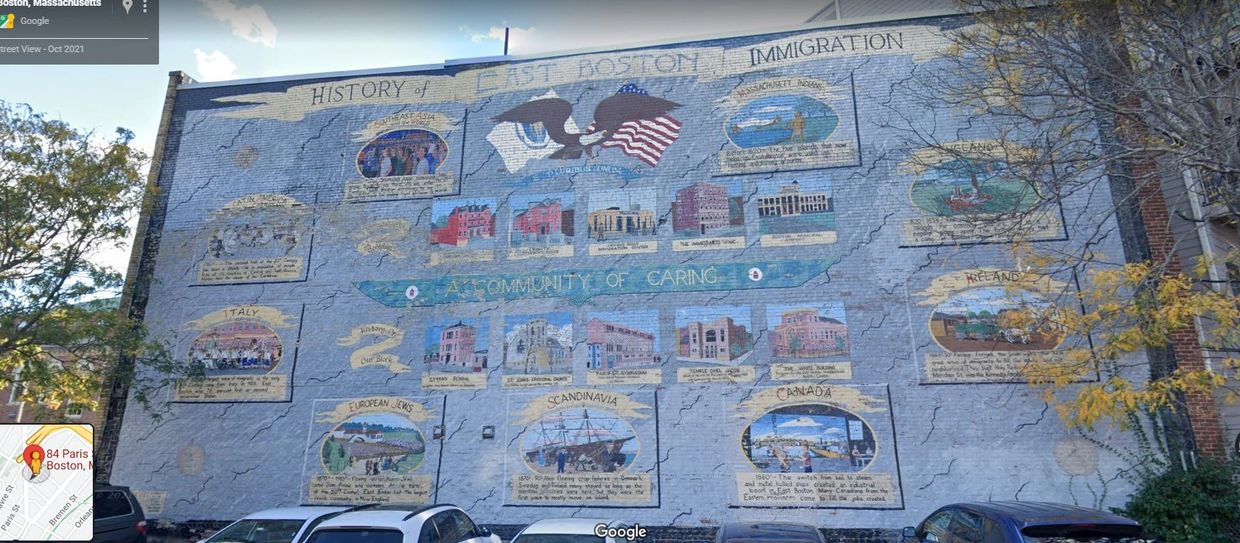More Photographs and Documents
Due to space limitations, we were unable to include these in the book. We are happy to post them on this page. We are also proud, at the bottom of this page, to include a link to an Air Force film of the 1967 attack on Da Nang Airbase, during which Tina's father was seriously wounded.
Where it all began...

Though taken about twenty years before VJ Day, this photo of the Boston Common shows, on the right, the Park Street subway kiosks where Charles Spataro sold newspapers. Near the ornate fountain on our left you can see a line of benches. It was on one of those benches where Spataro sat, waiting for his shift to begin on VJ Day, August 15, 1945, when a woman approached and asked him to watch her infant.

From his 1947 Boston Latin yearbook this is the newsboy Charles Spataro. (Not for nothing, but Latin was a tough school, and this kid also worked. We were impressed.)

This is the site of the Paris Street home of the Spataros. We love this wonderful mural which local artists painted on the remaining wall of the building in which theor home was located in August, 1945
His first stop... The Temporary Home

As we researched the details of Little Mister Victory's journey after his abandonment, we acquired the police report which recorded that he was taken from Joy Street Station to a place called "The Temporary Home" A state archivist pulled the handwritten record for August. His entry is at the bottom of this photo.

Zooming in, on the left, we see the names of officers Cannon and McGrath, whom the police report said had been flagged down by three women from Dorchester. (They had seen newsboy Charles Spataro with a fussing baby.) The Temporary Home record confirms it was they who delivered the baby.

Zooming in on the right side of the record we see Tosi and Tesorero, the officers who (for reasons explained in the book) were oredered to pick up the baby and take him to Boston City Hospital. The next day a picture of John Tesorero, holding Little Mister Victory, would be in a Boston newspaper. (It is trips down these archives -- and the finding of such details -- which make a researcher's day.)
Not quite yet...

The August 22, 1945 Boston Record front page featured Nurse Barbara Dayson taking Little Mister Victory's weight. However, the caption was wrong. The baby would not be transferred into state care for another five days. This was just one of many reports in the two weeks after his abandonment that were either partly - or wholly - incorrect which would send us down several dead ends.
Foster homes

In the first five years of his life Robert Harrington (as he was named by the state) lived in three foster homes. His departure from the first two were shrouded in mystery, until our research uncovered several harsh and troubling truths. Robert's last foster home was in Pembroke, where he lived with Harold and Cora Bouvier. This loving couple fostered many children from the 1930s to 1950s.
Robert's new parents

WW2 Navy veteran John Garvey and his wife, Dorothy (in the center of this picture) had been married for about ten years when they applied to adopt a child. In 1950, five year-old Robert Harrington would become Robert Garvey and begin his life in Boston.
The ad for the restaurant

Around the time they adopted Robert the couple would buy this restaurant in Melrose.
Garvey's Restaurant

Tina challenged us to find a picture of her family's restaurant in Melrose. Whoever found it first was promised a plate of cookies. That was all the incentive we needed! The only picture found was one featuring the building for Transitone, makers of state-of-the-art transistors in the 1950s, but which shows, across the street, the front entrance to Garveys.
Robert's first parade?

From his DCF file, we know that on June 17, 1950 Dorothy Garvey would take Robert to Charlestown for the Bunker Hill Day Parade 1950. It is noteworthy this picture of "The Rascal King" was placed at the top of the Boston Globe article on the parade. Though he had been voted out of office a year earlier, the loudest cheers from parade-goers still erupted when Curley passed.
Video of the July 1967 attack on Da Nang Airbase
Robert Garvey served America as an Air Freight Specialist stationed at Da Nang Airbase in Vietnam, and would receive the Purple Heart for the wounds he received during this July 1967 attack, which was captured on film. Click to view the video.
Copyright © 2024 David Kruh - All Rights Reserved.
Here are more links to some other interests and experiences:
Powered by GoDaddy
This website uses cookies.
We use cookies to analyze website traffic and optimize your website experience. By accepting our use of cookies, your data will be aggregated with all other user data.